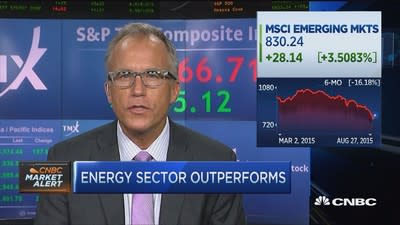Market bottom's in place: Strategist

Investors should expect continued high volatility in the stock market, but recent rout was a bottom, strategist Brian Belski said Thursday.
In fact, he's keeping his year-end target for the S&P 500 (INDEX: .SPX) at 2,250.
Drama and fear are what caused the dramatic decline, according to Belski.
"We believe that investors actually love this drama and fear. They've almost become too accustomed to it following 2008-2009, and we believe that fundamentals drive stocks longer term," the chief investment strategist with BMO Capital Markets said in an interview with CNBC's " Power Lunch ."
He thinks investors have been too focused on the macro, like slowing growth in China, and not enough on the micro.
"They're using what's happening in China to make excuses to sell. I think the bottom's in place."
He believes the best way to fight volatility is to buy high quality, fundamental names in the U.S. He specifically likes financials, industrials and technology.
What he's not buying, however, is oil and energy, despite U.S. crude soaring more than 10 percent higher Thursday.
"A bounce is not a trend," said Belski.
The problem is that energy companies have not employed strong structural changes such as the financial and technology sectors did after their bubbles, he noted.
"They have to dramatically decrease their cost structure. They have to look at what forecasts are; they drop those. They have to learn how to operate a company ... within a trading range, whether or not that trading range is $20 to $30 or $30 to $40."
However, Michael Yoshikami, founder and CEO of Destination Wealth Management, thinks there are some select opportunities in energy names such as Chevron (NYSE: CVX) and Exxon (NYSE: XOM).
While Chevron has fallen dramatically with the price of oil, he believes the dividend is safe because the company can sell assets to cover it if necessary.
"Most of the bottom is in the crude price. Could it go to $25, $30 as some are calling? It could. But if it does, Chevron will go down a bit, but you have a huge dividend," said Yoshikami, recently named among Barron's Top 100 Independent Financial Advisors for the seventh-consecutive year.
What's more, he doesn't expect oil to stay that low forever. He believes it will be $50 to $60 a barrel in the next two years.
"Everyone is going to say, 'Gee, I had this incredible opportunity to buy Chevron, but I was afraid.' Afraid of what? If you have a company that can sell assets and still pay dividends, I don't see what the downside is in this name," he said.
Disclosure: Michael Yoshikami does not own Chevron or Exxon but may purchase them for clients.
More From CNBC

